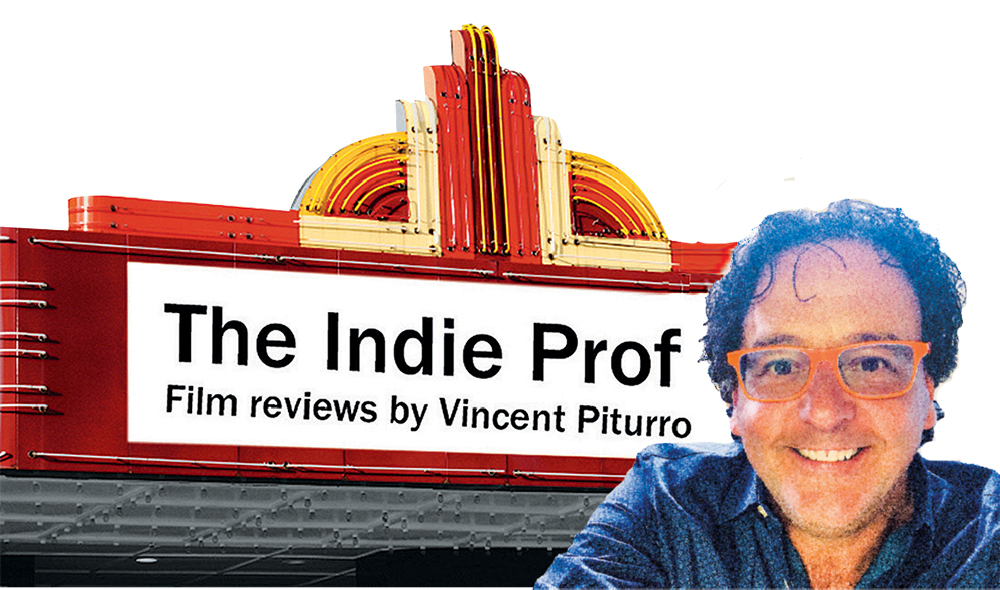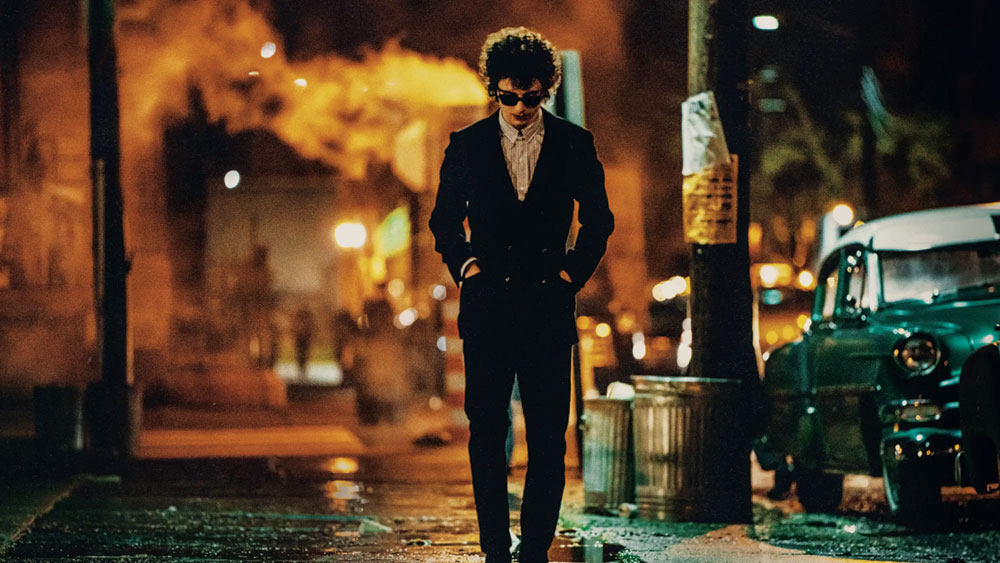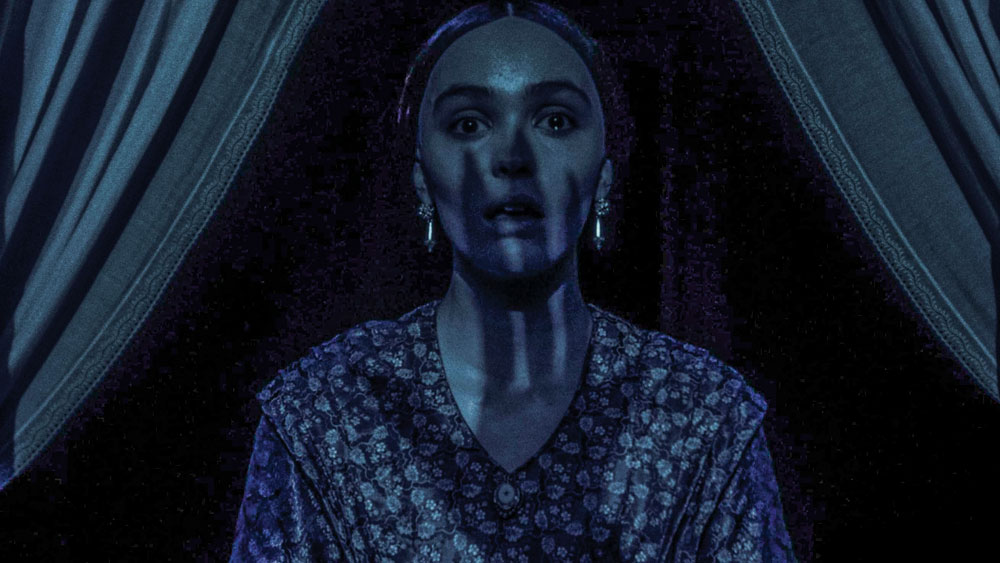
A founding principle of this column is that I review films you may not see reviewed in other places. That might include independent films, foreign films, local films, and film festivals. For the most part, I have kept to that principle. This month, I move away from that slightly to review two bigger films that I think require more attention. I also hope that you go to see these films on the big screen—in both cases—if for nothing other than the sound.
A Complete Unknown (2024)
I can see the pitch: “A film about Bob Dylan, but only a few years of his life—from 1961–1965, when he was very young—and the primary focus will be on the music.” I’m so glad a studio bit on this wild pitch because this is a wonderfully made, wonderfully acted, wonderfully executed smile of a film. In this sometimes dark and depressing world, I left the theater grinning, humming, and reminded of my youth. Nothing bad can come of that. The times, we know, are a…well, you get the gist of the column already.

A Complete Unknown
I’ve seen a million movies projected; I’ve seen a thousand film reels running; I’ve seen a hundred theaters filling; and I’ve seen tens of movies singing. This one stands out from musical biopics in many ways, the best part of which may be the remarkable ensemble performances. Timothée Chalamet, as Dylan, will get his well-deserved accolades and may win an Oscar, but the rest of the cast shines as well. Monica Barbaro, as Joan Baez, is luminous and Edward Norton is unrecognizable (in the best way possible) as Pete Seeger. All play real-life giants in the music world, and all—now pay attention to this part closely—sing and play all instruments themselves. I knew Chalamet did his own work, but I was blown away when I found out that the other actors did the same. The performances are refreshing, wonderful, and remarkable singular achievements as well as a stunning group achievement. Everyone should get Oscar nominations, and if not, then the Oscars are on their own.
The overall film itself is very good, and director James Mangold provides a steady hand. Mangold knows musical biopics, having helmed Walk the Line, among other excellent films (Cop Land, 3:10 to Yuma, Ford vs. Ferrari). The period settings are wonderful, and as a native New Yorker who caught the tail end of the gritty, dirty, and even obscene Greenwich Village of the ‘60s/‘70s, I was overjoyed to see that area/era come to life. The cinematography is solid, the editing moves the material along nicely, and the sound is downright uplifting. Overall, I found the film to be invigorating, cleansing, and like most good films—especially biopics—it left me wanting more.
Critics and cynics will say that this isn’t accurate, or that isn’t accurate, or it didn’t do this or it didn’t do that. Fine. Bob Dylan himself is happy with it, and he even made notes on the script for Mangold. Historical films never please everyone, nor should they. What the film does, however, it does very well, and it is masterfully executed.
Go see it in the theater. How many times must I ask you to go to the theater before you actually go? How many reviews must I give before one finally stirs? How many nights on the couch must fly by before you will get up and go? The answer, my friends, is playing on screens right now. Don’t make me write another column like this!
Nosferatu (2024)
This film will scare you, and it is serious fun. But make no mistake, it is also disturbing and unpleasant, even vile at times. It’s a phenomenal film that is based on the original, classic, groundbreaking, and trailblazing Nosferatu (1922—F.W. Murnau), with elite directing by the eclectic Robert Eggers (The Witch, The Lighthouse) to go along with superb acting, settings, cinematography, editing, and sound. I think it will be loved and adored by many. I give a short review that will provide why I think that is true, but I will also add a postscript as an academic, film historian, and expert in vampire film history. Stick around for that.

Nosferatu
Of the cinematic aspects, the sound is particularly expressive and immerses us in the world like nothing else can. It’s as if the sound literally shakes the fabric of the world of the film at points, and therefore, it shakes the film itself. The cinematography is exceptional, and Jarin Blaschke should be nominated for an Academy Award in that category. The camera and lighting complement the sound in rippling the world we see/feel, and it effectively sutures us into the celluloid.
I will add one postscript: Overall, I was a bit disappointed, although I think I will be in the very distinct minority. As a film scholar and film historian, I think Murnau’s Nosferatu is one of the great films of all time. Comparing this version to Murnau’s is unfair in many ways, but I think this one lacks the intricate subtext and depth of the original. That original had multiple layers of social and political context, particularly about antisemitism and xenophobia. This film is shorn of such depth, and that was disappointing. It missed the opportunity to say similar things about our world today, just as Murnau was commenting on post-WWI Germany. It’s also possible that after only one screening, I may have missed some things. If so, I will retract.
As I said, I will be in the minority here, and that last part comes from an academic standpoint. Almost everyone is going to love the film, and they should. It’s a remarkable piece of cinema. Now, go to the movies.
Vincent Piturro, PhD., is a Professor of Film and Media Studies at MSU Denver. Contact him directly at vpiturro@msudenver.com or follow him on Twitter. For more reviews, search The Indie Prof at FrontPorchNE.com.




0 Comments